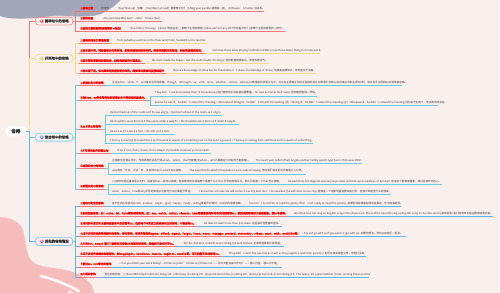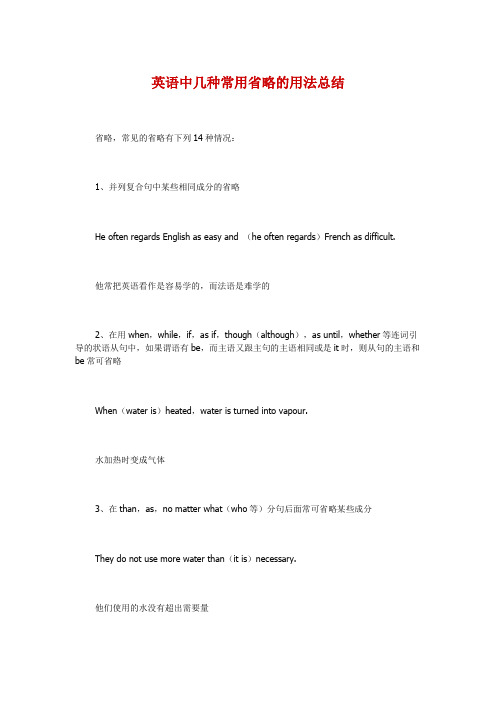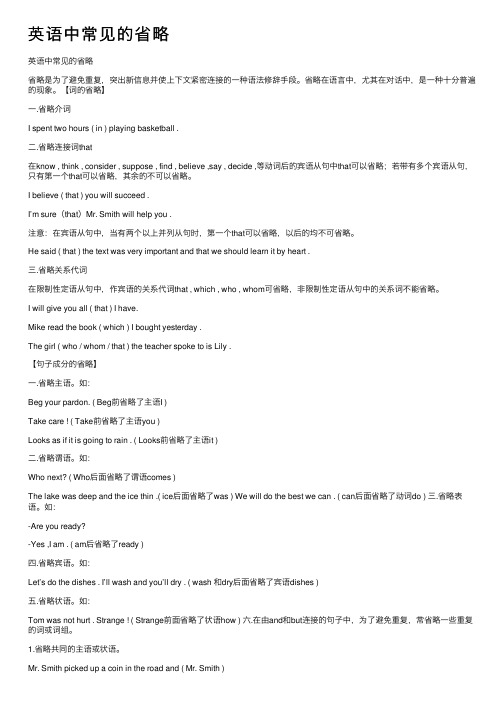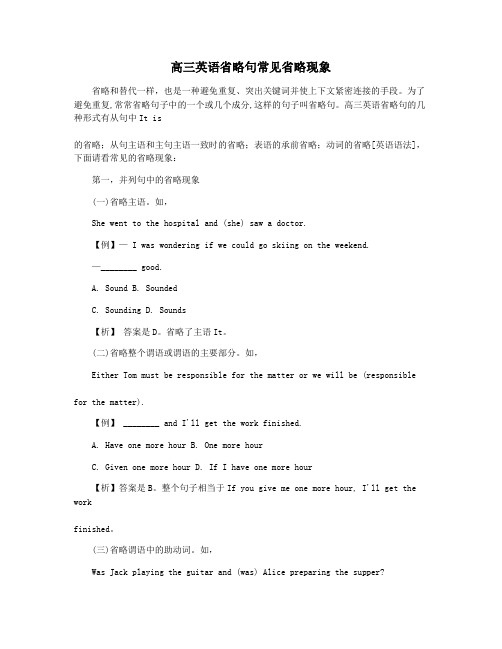英语中常见的省略
英语中省略介词的七种常见情形doc

英语中省略介词的七种常见情形1. 介词on的省略表示星期、日期等的时间的介词on有时可省略:I’ll arrive (on) Friday. 我将星期五到。
See you (on) June 21st. 6月21日见吧。
2. 介词for的省略(1) 表示一段时间或距离前的介词有时可省略:I lived there (for) ten years. 我在那儿住了10年。
They walked (for) fifty miles. 他们走了50英里。
但在否定句中或用于句首时,介词for通常不能省略:For ten years he lived here. 他在这里住过10年。
We have not heard from him for a long time. 我们很久没收到他的来信了。
另外,若所修饰的动词不是在整个时间范围内都自始自终延续,则for也不省略:I taught her for three years. 我教过她三年。
(其中的for不能省略)(2) 某些结构中表示原因的介词for有时可以省略:Pardon me (for) interrupting you. 请原谅我打断你的话。
We quite envy you (for) your success. 我们十分羡慕你的成功。
Please forgive me (for) my fault. 请原谅我的过错。
3. 介词at的省略what time前的介词at通常可以省略:What time did he leave here? 他是什么时候离开这儿的?另外,在“about [around] 时间名词”前的介词at也通常省略:He arrived (at) about ten o’clock. 他大约(在)10点钟到的。
at home 这一短语中的介词at在美国英语中通常省略:Let’s stay (at) home this evening. 今晚我们就呆在家里吧。
英语中的几种省略现象

英语中的几种省略现象,这样分类学起来简单多了!英语中有时为了避免重复,使语言简练紧凑,在不损害句子结构的前提下,往往省去一个或多个句子成分,这种语法现象称为省略。
1简单句中的省略简单句中的省略,在口语中最为常用,可省略主语、谓语、主语和谓语的一部分、宾语等。
例如:a. (It) Sounds like a good idea.b. (Is there) Anything else?2并列句或并列结构中同等句子成分的省略在并列句或并列结构中,如果前后两部分有同等句子成分,为避免重复,同等句子成分可以在一处省略。
例如:a. Mary is tall and (she is) beautiful.b. I can’t decide whether to go to the library or not (to go to the library). 3状语从句中的省略1. 在时间、条件、让步等状语从句中,若从句的主语和主句的主语相同且从句中的谓语动词含有be动词,可以省略从句中的主语和be动词。
例如:Unless (I am) invited, I will not go to your birthday party.2. 在if it is possible, when it is necessary等类似结构中,it is常可省略。
例如:If (it is) possible, Lisa will do a part-time job.4定语从句中的省略当关系代词that,which等在限制性定语从句中充当宾语且不位于介词之后时,关系代词可以省略;in which或that在先行词way后时可省略。
例如:a. Is the book (that / which) you’re reading interesting?b. This is the way (in which / that) your parents love you.5不定式符号to的省略1. 在感官动词(see, hear, feel等)和使役动词(have, make, let等)后作宾语补足语时,不定式符号to需省略。
英语中的省略

英语中的省略为了避免重复,英语句子中某些部分可以省略。
常见的省略有以下几种:一、状语从句中的省略在时间、条件、让步及比较状语从句中,如主句和从句主语一致(或从句主语是it),且从句含be动词时,可将从句中的主语和be动词省略,从而构成“连词+ 分词/形容词/副词/介词”结构。
这里常见的连词有when/while/as/if/unless/once/although/though/than等。
When (water is )heated, water is turned into vapor. 水加热时变成气体。
He works very hard though(he is)rather weak. 他尽管体弱,但他十分努力地工作。
He came earlier than(he had been)expected. 他来得比预料的要早。
考例:①The research is so designed that once ____ nothing can be done to change it.A. beginsB. having begunC. beginningD. begun②If you go to Xi' an, you will find the palaces there more magnificent than commonly ___ .A. supposingB. supposedC. to supposeD. suppose分析:①D。
once后省略了the research is begun ②B。
比较状语从句中的完整形式是:than they are commonly supposed。
二、并列结构的省略1.并列结构一般由and, or, but等连接,他们可以连接单词、短语或分句,其中相同成分出现时可以被省略。
One of the sides of the board should be painted yellow, and ____.A.the other is whiteB. another whiteC. the other whiteD. another is white选C。
英语中几种常用省略的用法总结

英语中几种常用省略的用法总结省略在英语语言的应用非常广泛,其中有很多常用的省略用法。
下面总结一下以往常见的一些省略形式:一、表示未表达完整的缩写1、单字缩写。
如: is,>’s; has,>’s; have,>’ve;I,>I’m; he,>he’s; she,>she’s; do,>do’s;does,>does’s; am,>am’s2、多字缩写。
如:are not,>aren’t; cannot,>can’t; do not,>don’t; will not,>won’t; have not,>haven’t; would not,>wouldn’t; could not,>couldn’t; shouldnot,>shouldn’t; it is,>it’s; that is,>that’s; there is,>there’s二、表示不完整词组的省略1、定语从句中的省略。
如:(1) All the students (who are) present here are eager to study.(2) This is the reason (why) he decided to quit his job.2、表示概念的省略。
如:(1) TV and radio (programmes).(2) To do more exercise (is beneficial to your health).三、表示句子成分的省略1、宾语的省略。
如:(1) I like to read (books).(2) He gave me an answer (to my question).2、表语的省略。
如:(1) He is a teacher (of English).(2) The weather today is (very) hot.3、主语的省略。
英语语法中的省略有哪些

英语语法中的省略有哪些英语是按照分布面积而言最流行的语言,但母语者数量是世界第三,仅次于汉语、西班牙语。
它是学习最广泛的第二语言,是近60个主权国家的官方语言或官方语言之一。
下面是店铺为大家收集的英语语法中的省略有哪些,欢迎阅读,希望大家能够喜欢。
英语语法中的省略有哪些一、并列复合句中某些相同成分的省略。
二、在when,while,if,asif,though(或although),as,until,once,whether,unless,where等连词连接的状语从句中,常省略跟主句相同的主语和be动词。
三、当见到“when(或if,where,wherever,whenever,assoonas,asfastas,than等)+possible/necessary等”时,可理解中间省略了itis(或was)。
四、有形式主语it的主语从句可省略that。
五、在限制性定语从句中可省略作宾语的关系代词whom,which,that。
六、在direction(方向),way(方式),distance(距离),time(时间),times(倍数)等后面所接的定语从句中常省略that,which,inwhich。
七、以therebe开头的句子,其主语的定语从句常可省略关联词,而therebe结构作定语从句时,省略作主语的关系代词。
八、命令句、惊叹句、部分第一人称的陈述句、部分问句和答句中省略最为常见。
九、用so,not或其它手段来省略上文或问句中的'一部分或整个句义。
小升初英语语法省略句知识点1. 省略句的定义省略是为了避免重复、突出新信息并使上下文紧密连接的一种语法修辞手段。
省略在语言中,尤其在对话中,是一种十分普遍的现象。
2.小品词的省略1)省略介词I ‘ ve studied English (for) five years. 我已学五年英语了。
2)省略连词thatI believe (that) you will succeed . 我相信你们会成功的。
英语语法---省略

省略1简单句中的省略2并列句中的省略3复合句中的省略4其他的省略情况1.省略主语2.省略宾语3.省略主语和谓语(或谓语的一部分)1.动词不定式的省略2.某些使役动词,如:m a k e,le t,h a v e等和感官动词,如:see,w a t c h,no ti ce,o b ser v e,h ear等后⾯作宾补的不定式须省略t o,但若这些动词⽤于被动语态,则t o不省略。
3.并列的不定式可以省略后⾯的不定式符号t o。
但若两个不定式之间表⽰对⽐关系时,不能省略t o。
4.当不定式在某些动词后作宾语时,常可省略。
常⻅的动词有agree,a ff or d,e xp ec t,f orge t,h o p e,k no w,m anage,p re t en d,re m e mb er,re f use,w an t,wi s h,w oul d l ik e等。
5.介词b u t,e x ce pt (除了) 前有实义动词d o的某种形式时,后⾯的不定式不带t o。
6.当不定式作某些复合谓语时,如b e go i ng t o,b e a b le t o,h a v e t o,oug ht t o,use d t o等,可只保留不定式符号t o。
7.使⽤so,no t等时的省略8.介词的省略(Y ou co m e) Thi s w a y,p lease. 请这边⾛。
(省略了主语和谓语) (Ha v e y ou) G o t an y i n k? 你有墨⽔吗?(省略了主语和谓语的一部分)常⻅的结构有: (1)h a v e diffi cul ty/t rou b le (i n) d o i ng s th. (2)b e b us y (i n) d o i ng s th. (3)s p en d so m e tim e (i n) d o i ng s th. (4)s t o p/p re v en t s b. (f ro m) d o i ng s th. Th e h ea vy ra i n p re v en t e d him (f ro m) arr ivi ng th ere on tim e.—Can y ou fi n i s h y our w or k t o d a y? —I thi n k so./I d on’t thi n k so./I thi n k no t. ——你今天能完成⼯作吗? ——我认为能。
初中英语中省略介词的10种常见情形

初中英语中省略介词的10种常见情形,听说过吗?在英语中,介词很多,出现的频率很高。
但我们发现,在一些时候,本来需要用介词,可却没有用,或可用可不用时就不用了,这就是介词被省略的现象。
这种现象是英语中大家约定俗成的,符合英语表达的习惯。
今天我们来总结一下,英语中介词省略的情形。
. 1.当表时间的名词或名词词组被last, next, this, that, every, any等修饰时,与它们搭配的介词(in, on, at等)常常省略。
You may ask me for help (at) any time.. 你任何时候都可以请我帮忙。
. I Will see you next week.. We all worked hard last year.. They are arriving this Friday afternoon..当in this way ,in the way, in that way三个短语中的介词in可省略。
on’t look at me (in) that way.不要那样看着我。
I’ve learned a lot (in) that way.3. spend time, have difficulty (trouble, a hard time)+in + doing 结构中的介词in 常省略。
I spent the whole afternoon (in) practicing the song.Mr.Yang has trouble (in) listening.We used to have a hard time (in) living in the city .4. 忙于做某事be busy in doing sth. 中的in 可以省略。
All students in our school are busy (in) preparing for the speech. 我们学校的所有学生都在忙于准备演讲。
完整版英语省略句的六大总结

完整版英语省略句的六大总结
1.主语省略:当主语已经被上下文所明确时,可以省略主语。
例句:(原句)I am going to the bookstore.
(省略) Going to the bookstore.
2.谓语动词省略:当谓语动词已经被上下文所明确时,可以省略谓语动词。
例句:(原句)She can play tennis very well.
(省略) She can play very well.
3.宾语省略:当上下文中已明确了宾语时,可以省略宾语。
例句:(原句) Would you like to have some watermelon?
(省略) Would you like some?
4.介词省略:当介词与其宾语紧密相连,且已明确时,可以省略介词。
例句:(原句) We are waiting for you in the park.
(省略) We are waiting for you the park.
5.主语从句省略:当主语从句中的主语与句子的主语相同,可
以省略主语从句。
例句:(原句) That he could swim surprised me.
(省略) To swim surprised me.
6.定语从句省略:当定语从句中的关系代词为主语时,可以省略关系代词。
例句:(原句) The book that I borrowed from the library is very interesting.
(省略) The book I borrowed from the library is very interesting.。
英语中的各种“省略”

英语中的各种“省略”一、简单句中的省略1. 省略主语1)祈使句中的主语通常被省略。
如:(You) Open the door,please.请开一下门。
2) 其它省略主语多限于现成的说法。
如:a) (I) Thank you for your help 谢谢你的帮助。
b) (It )Doesn’tmatter.没关系。
2. 省略主谓语或主谓语的一部分a) (There is) No smoking.禁止抽烟b) (Is there)anything else ? 还有其他事吗?c) (You come)This way please.请这边走。
d) (Will you) Have a smoke ? 抽烟吗?3. 省略宾语—Do you know Mr. Li ? 你认识李先生吗?—I don’t know (him.) 我不认识他4. 省略表语—Are you thirsty ? 你30岁了吗?Yes , I am (thirsty).是的,我是。
5. 同时省略几个成分—Are you feeling better now? 你觉得好些了吗?—(I am feeling ) Much better(now) 好多了。
(I wish) Good luck (to you) .祝你好运/祝你顺利。
二. 并列复合句中的省略在并列句中后边的分句可以省略与前边分句中相同的成分。
如:a) The boy picked up a coin in the road and (the boy ) handed it to a policeman.这个男孩在马路上拾起一枚硬币并把他交给了警察。
b) Your advice made me happy but(your advice made) Tom angry .你的建议使我高兴但使汤姆生气。
c) Tom must have been playing basketball and Mary (must have been)doing her homework.汤姆肯定一直在打篮球,玛丽一直在写作业。
省略句的常见形式与虚拟语气与宾语从句的关系

省略句的常见形式与虚拟语气与宾语从句的关系在英语语法中,省略句是一种常见的句子构造形式,它可以简化表达,减少重复,并增加语言的流畅性。
虚拟语气和宾语从句则是两个与省略句密切相关的语法现象,在句子中起着重要的作用。
本文将重点探讨省略句的常见形式、虚拟语气以及宾语从句与省略句之间的关系。
一、省略句的常见形式1. 主语省略主语省略指的是在句子中省略了主语,常出现在陈述句中,日常生活中的对话中尤为常见。
例如:- Are you coming? (你来吗?)- Hope so. (希望如此。
)2. 动词省略动词省略是指省略句中的谓语动词,常出现在情态动词、感官动词、系动词等后面。
例如:- Can you swim?- I can. (我会。
)3. 动词短语省略动词短语省略是指省略句中的动词短语,常出现在对话中,用于回答之前提到的动作或情况。
例如:- Did you buy the book?- Bought it yesterday. (昨天买了。
)二、虚拟语气与省略句虚拟语气是英语中一种重要的语法现象,用于表示与事实相反的假设、愿望、建议、命令等情况。
虚拟语气与省略句之间常有紧密的联系,特别是在条件从句和宾语从句中。
1. 条件从句在条件从句中,省略句常常用来简化重复的表达,而虚拟语气则用于表示与事实相反的假设。
例如:- If I were you, I would go. (如果我是你,我会去。
)- If I had time, I would help. (如果我有时间,我会帮忙。
)2. 宾语从句宾语从句是一个句子作为宾语出现在主句中,而省略句的使用可以让句子更简洁明了。
虚拟语气在宾语从句中的使用也是常见的。
例如:- I suggest (that) he come early. (我建议他早点来。
)- She insisted that he be present at the meeting. (她坚持他参加会议。
英语中的省略句,尤其是英语口语

英语中的省略句,尤其是英语口语省略句是英语的一种习惯用法。
按照语法的分析,句子应该具备的成分,有时出于修辞上的需要,在句中并不出现,这种句子叫做省略句1. 简单句中的省略:在对话中,交谈双方都知道谈论的对象,则可以省略句子的主语,省略主语和谓语的现象在交际用语中出现的很多。
(1)Looks like rain.(2)Hope to hear from you soon.(3)Sounds like a good idea.(4)Beg your pardon.(5)Feeling better today ?(6)This way, please.(7)—What does he want to eat ?—Some rice and vegetables.(8)Anything I can do for you ?(9)Sorry to hear that.(10)Doesn’t matter.(11)Terrible weather!(12)Pity you couldn’t come.2. 并列句中的省略:在并列句中,相同的成分如主语,谓语,宾语等都可以省略:(1)They learn French and we English.(2)My father planned and built all these houses.(3)John won the first race and Jimmy the second.(4)Coral is not a plant but a variety of animal life.3. 复合句中的省略:定语从句:(1)That’s the reason he is late for the confere nce.(2)I don’t like the way he talks.状语从句:(1)If heated, water will boil.(2)Tom was attacked by cramp while swimming across the river.(3)We’ll go to help you if necessary.(4)Had I time, I would come.(5)I’ll go, should it be necessary.(6)The captain can find a boat quicker than we can.宾语从句:如果宾语从句中的谓语部分与主句的谓语部分或上文的谓语部分相同,可将从句部分的谓语省略。
英语中几种常用省略的用法总结

英语中几种常用省略的用法总结省略,常见的省略有下列14种情况:1、并列复合句中某些相同成分的省略He often regards English as easy and (he often regards)French as difficult.他常把英语看作是容易学的,而法语是难学的2、在用when,while,if,as if,though(although),as until,whether等连词引导的状语从句中,如果谓语有be,而主语又跟主句的主语相同或是it时,则从句的主语和be常可省略When(water is)heated,water is turned into vapour.水加热时变成气体3、在than,as,no matter what(who等)分句后面常可省略某些成分They do not use more water than(it is)necessary.他们使用的水没有超出需要量4、在know,think,consider,suppose,find,belive,say,decide等动词后面所接的宾语从句中,连接词that常可省略I think(that)it will clear up this afternoon.我想今天下午天会转晴5、在限制性定语从句中,作宾语用的关系代词whom,which,that常省略;在以the same...as和such...as引出的某些定语从句中,也可以省略与主句相同的成分This is one of the best films(that)I've ever seen.这是我所看过的最好的电影6、在以there is开头的句子中,修饰主语的同位语从句的连接词常省略,修饰主语的定语从句的关系代词作主语,有时可以省略There is a table(that)stands in the corner.墙角处放着一张桌子7、用so,not或其他手段来替代上文或问句中的一部分或整个句意--Can he do this work?他能做这件工作吗?--I think so. 我想他行8、在某些动词后的宾语补语和主语补语中可将to be省略These books are thought(to be)very valuable人们认为这些书很有价值9、在“the+比较级...the+比较级...”结构中,有时可省略be或there be The higher the temperature(is),the greater the pressure(is)温度越高,压力越大10、某些动词在接that从句时,不用与之搭配的介词We agreed that is was a mistake.我们一致认为,这是一个错误11、用to表示前述动词不定式,其后面有关成分省略You may go home if you like(to)你如果想回家就可回家12、在某些虚拟语气的句子中可以省略shouldI suggest that he(should)study more English before going abroad. 我建议他出国前多学点英语13、在用so+that连接的从句中,常省略so或thatWe are very tired,(so)that we had better hurry home.我们很累,所以我们还是赶快回家去吧14、省略介词in的几个固定词组He spends his evenings(in)studying English他把晚上的时间花在学英语上。
英语中常见的省略

英语中常见的省略英语中常见的省略省略是为了避免重复,突出新信息并使上下⽂紧密连接的⼀种语法修辞⼿段。
省略在语⾔中,尤其在对话中,是⼀种⼗分普遍的现象。
【词的省略】⼀.省略介词I spent two hours ( in ) playing basketball .⼆.省略连接词that在know , think , consider , suppose , find , believe ,say , decide ,等动词后的宾语从句中that可以省略;若带有多个宾语从句,只有第⼀个that可以省略,其余的不可以省略。
I believe ( that ) you will succeed .I’m sure(that)Mr. Smith will help you .注意:在宾语从句中,当有两个以上并列从句时,第⼀个that可以省略,以后的均不可省略。
He said ( that ) the text was very important and that we should learn it by heart .三.省略关系代词在限制性定语从句中,作宾语的关系代词that , which , who , whom可省略,⾮限制性定语从句中的关系词不能省略。
I will give you all ( that ) I have.Mike read the book ( which ) I bought yesterday .The girl ( who / whom / that ) the teacher spoke to is Lily .【句⼦成分的省略】⼀.省略主语。
如:Beg your pardon. ( Beg前省略了主语I )Take care ! ( Take前省略了主语you )Looks as if it is going to rain . ( Looks前省略了主语it )⼆.省略谓语。
英语中的省略句和省略句的规则

英语中的省略句是一种特殊的句型,通过省略部分句子成分,使句子更加简洁、流畅。
省略句的使用可以提高句子表达的效果,但也需要注意一些规则。
在英语中,常见的省略句有主语、谓语、宾语和其他成分的省略。
以下是一些常见的省略句规则:1.主语的省略当主语已经在上下文中明确指出时,可以省略主语。
例如:•Who is the winner? (Who: 主语)•Tom is. (Tom: 主语)2.谓语的省略当句子中的谓语动词与上文中的主谓一致时,可以省略谓语动词。
例如:•Have you finished your homework? (Have you: 谓语动词)•Yes, I have. (I have: 谓语动词)3.宾语的省略当宾语是不定式短语、动名词短语或从句时,有时可以省略宾语。
例如:•I want to eat some ice cream. (to eat some ice cream: 宾语)•I want to. (to: 宾语)•She enjoys swimming in the summer. (swimming in the summer: 宾语)•She enjoys it. (it: 宾语)4.其他成分的省略有些介词短语或副词短语在语境中已经明确,可以省略。
例如:•Peter is going to the supermarket. (to the supermarket: 介词短语)•So is Mary. (So: 其他成分)•He said he would visit us tomorrow. (tomorrow: 副词短语)•He said he would. (He: 其他成分)正如以上所述,省略句是一种简化语句结构的技巧,使句子更加简洁。
然而,省略句也有一些注意事项。
首先,省略句要根据上下文进行判断。
如果没有足够的上下文信息,可能会造成误解。
其次,省略句需要遵守语法规则。
(完整版)英语省略句的六大总结

英语中的六大省略现象概念:为了避免重复,省略句中的一个或几个句子成分,这种语法现象称为省略1. 简单句中的省略现象(6)名词所有格修饰的名词若表示店铺、 住宅、 教堂或上下文已暗示或明确指出过 的事物。
例如:例:( 1)在对话中,例如:— How is your mother today?— (She is) Much better.(2) 在祈使句中,例如: (You) Open the door, please!(3) 在感叹句中,例如: What a (good) boy (he is)! How (hard) they are working!( 4)表示讲话人的意见和看法, (It) sounds fine to me.(It's a) pity you couldn't come.(5)提问,例如: (Is there) anything wrong? (Have you)found the treasure? 你妈妈今天怎样? 她)好多了。
请开门!多好的男孩啊!他们工作得多努力呀!上下文意思很清楚,例如:你不能来,真遗憾。
发生了什么事吗?你已经找到珠宝了吗? at her mother's (house)在她妈妈家里 at the doctor's (house)在医院里 at the barber's (shop)在理发店里 at the tailor's (shop) 在裁缝店里(7)动词不定式的省略。
式符号 前面出现过的动词在下文再次出现时, to 。
动词不定式的省略,一般只省略动词,而保留符号“ 可以单纯使用不定 to ”。
例如:—Will you go with me? 你愿意跟我一块去吗?—Well, I'd like to(go with you). 我非常愿意。
I'd like to. 也可用I'd love to. /I'd be happy to. 来取代。
英语省略句

高考英语考点-省略句省略句是高考考查的语法重点,又是学习的难点。
在英语中,为了使句子简洁明快,突出重点,常用"省略句",只要不影响句意的表达,能省略的成分尽可能省略。
省略现象随处可见,大致可分为以下几种情况。
一、句子成分的省略1. 省略主语。
如:Haven't seen you for ages!好久不见了!2.省略谓语。
如:(Is there) Anything you want? 你要什么东西吗?(Does) Anybody need help? 有人要帮忙吗?3. 省略宾语。
如:I don't know (where he is ). 我不知道。
4.省略主语和谓语(或谓语的一部分),只剩下表语、宾语、状语或其它成分。
如:(I'm) Afraid I can't come. 恐怕我不能来了。
(Have you) Got any ink? 你有墨水吗?【高考链接】-It’s a long time since I saw my sister.(2007全国卷1)-_________her this weekend?A. W hy not visitB. Why not to visitC. Why not visitingD. Why don’t visit解析:答案为A。
本题考察省略结构,这里why not visit =Why didn’t you visit ,这种既注重基础又兼顾生活交际的试题,其实多数学生感觉很容易能得出正确的A答案。
二、复合句的省略1.在含有状语从句的复合句中由when,while,as, once,whenever引导的时间状语从句;或由if,unless引导的条件状语从句;由though,although,even if ,even though引导的让步状语从句;由as though,as if,as引导的方式状语从句;由because引导的原因状语从句;由wherever引导的地点状语从句,若从句的主句是it或与主句的主语相同,且在谓语中含有be时,常省略从句的主语和be。
高三英语省略句常见省略现象

高三英语省略句常见省略现象省略和替代一样,也是一种避免重复、突出关键词并使上下文紧密连接的手段。
为了避免重复,常常省略句子中的一个或几个成分,这样的句子叫省略句。
高三英语省略句的几种形式有从句中It is的省略;从句主语和主句主语一致时的省略;表语的承前省略;动词的省略[英语语法],下面请看常见的省略现象:第一,并列句中的省略现象(一)省略主语。
如,She went to the hospital and (she) saw a doctor.【例】— I was wondering if we could go skiing on the weekend.—________ good.A. SoundB. SoundedC. SoundingD. Sounds【析】答案是D。
省略了主语It。
(二)省略整个谓语或谓语的主要部分。
如,Either Tom must be responsible for the matter or we will be (responsible for the matter).【例】 ________ and I'll get the work finished.A. Have one more hourB. One more hourC. Given one more hourD. If I have one more hour【析】答案是B。
整个句子相当于If you give me one more hour, I'll get the workfinished。
(三)省略谓语中的助动词。
如,Was Jack playing the guitar and (was) Alice preparing the supper?(四)省略谓语中主要动词。
如,Albert needn't stay, but George must (stay).(五)省略宾语。
英语可以省略的成分

英语可以省略的成分英语可以省略的成分导语:英语当中的成语不是全部都可以省略的,下面YJBYS店铺向大家介绍英语可以省略的成分,欢迎参考!1. 省略主语(You) Help yourself to some fish, please. 请随便吃些鱼。
(I) Beg your pardon? 请再讲一遍。
(You) Cheer up. 振作起来。
(I) Thank you for telling me about it. 谢谢你告诉我这件事情。
(It) Doesn’t matter. 没关系。
(You) Come on, please. 请过来吧。
2. 省略主谓语或主谓语中一部分(You come ) This way, please. 请这边走。
(I’ll go) After you, please. 前面请。
Why (do you ) not join us? 为什么不加入到我们一起来呢?—How do you like that story? 你认为那个故事怎么样?—(It is) Just so-so. 只是一般。
(Do you need ) Anything else? 还需要别的东西吗?Are you a worker or (you are ) a farmer? 你是工人还是农民?3. 省略谓语或谓语中的一部分—Who wants it? 谁想要?—I do. / Me. 我(想要) 。
—Who is in the room? 谁在房间里?—Li Lei (is in it). 李蕾。
—Who is there? 谁在那儿?—Me. 我。
当句子的谓语部分省略时,名词用普通格,而代词用宾格。
4. 省略宾语—Who has a pen on him? 谁身上带有笔?—I have (one). 我有。
—Where is Tommy now? 汤米现在在哪?—I don’t know ( where Tommy is now). 我不知道。
- 1、下载文档前请自行甄别文档内容的完整性,平台不提供额外的编辑、内容补充、找答案等附加服务。
- 2、"仅部分预览"的文档,不可在线预览部分如存在完整性等问题,可反馈申请退款(可完整预览的文档不适用该条件!)。
- 3、如文档侵犯您的权益,请联系客服反馈,我们会尽快为您处理(人工客服工作时间:9:00-18:30)。
英语中常见的省略省略是为了避免重复,突出新信息并使上下文紧密连接的一种语法修辞手段。
省略在语言中,尤其在对话中,是一种十分普遍的现象。
【词的省略】一.省略介词I spent two hours ( in ) playing basketball .二.省略连接词that在know , think , consider , suppose , find , believe ,say , decide ,等动词后的宾语从句中that可以省略;若带有多个宾语从句,只有第一个that可以省略,其余的不可以省略。
I believe ( that ) you will succeed .I’m sure(that)Mr. Smith will help you .注意:在宾语从句中,当有两个以上并列从句时,第一个that可以省略,以后的均不可省略。
He said ( that ) the text was very important and that we should learn it by heart .三.省略关系代词在限制性定语从句中,作宾语的关系代词that , which , who , whom可省略,非限制性定语从句中的关系词不能省略。
I will give you all ( that ) I have.Mike read the book ( which ) I bought yesterday .The girl ( who / whom / that ) the teacher spoke to is Lily .【句子成分的省略】一.省略主语。
如:Beg your pardon. ( Beg前省略了主语I )Take care ! ( Take前省略了主语you )Looks as if it is going to rain . ( Looks前省略了主语it )二.省略谓语。
如:Who next? ( Who后面省略了谓语comes )The lake was deep and the ice thin .( ice后面省略了was ) We will do the best we can . ( can后面省略了动词do ) 三.省略表语。
如:-Are you ready?-Yes ,I am . ( am后省略了ready )四.省略宾语。
如:Let’s do the dishes . I’ll wash and you’ll dry . ( wash 和dry后面省略了宾语dishes )五.省略状语。
如:Tom was not hurt . Strange ! ( Strange前面省略了状语how ) 六.在由and和but连接的句子中,为了避免重复,常省略一些重复的词或词组。
1.省略共同的主语或状语。
Mr. Smith picked up a coin in the road and ( Mr. Smith )handed it to a policeman .2.若主语不同而谓语助动词、情态动词相同,则省略后面的情态动词或助动词。
Jack must have been playing football and Mary ( must have been ) doing her homework .3.若主语与谓语相同,则省略后面的主语成分。
His advice made me happy , but ( his advice made ) Jim angry .4.若主语不同,但主要动词及后续部分相同,则省略主要动词及后续部分。
I was born in winter 1998 and Bob ( was born in winter ) in 1989 .5.省略重复的介词,连词及后续部分。
He was late because he had overslept and ( because he had ) missed the train .【特别提醒】一.省略句可同时省略掉句子的几个成分。
如:What exciting news ! ( = What exciting news it is ! ) Pity he has failed . ( It is a pity that he has failed .)二.英语中有一些固定的省略结构:1.在以if , when , while ,till ,though ,as soon as , whenever ,as if , as , whether , than , unless 等连词引导的状语从句中,如从句中的主要动词是be ,而主语又跟主句主语相同或是it时,则从句的主语和动词be常省略。
如:If necessary , we shall send a telegram home .While cycling , don’t forget to see the traffic lights .I will not go to the party unless ( I am ) invited .Though ( he was ) tired , he was not disheartened .I Will go to Beijing next week if ( it is ) possible .Errors if ( there are ) any , should be corrected .注意:there be的省略He got to school earlier than ( he had been ) expected .2.由固定词组引导的疑问句。
如:What about playing basketball ?What if it is raining ?3.在口语中,为了避免重复,不定式可以省去和句子前部分重复的动词原形而只保留不定式符号to。
如:He may leave if he wishes to .Don’t go till I tell you to .4.被省略的部分一般可以在句子中补上,但有时省略结构已经定型,如果把省略部分补上,反而不合乎习惯。
如:He is shorter than I am . ( am之后省略short ,补上不合习惯。
)No parking .禁止停车。
告示用语( = No parking is allowed here .)还有一些习惯表达很难补上省略的部分。
如:Not at all .No matter .三.用于虚拟语气中1.虚拟条件句中得省略if ,将were ,had , should(万一)提前构成部分倒装。
Should there be a flood ( If there should(万一) be a flood ) ,what should (应该) we do ?Had he taken my advice , ( If he had taken my advice) , he would have done it better .2.在与suggest / request / order / advise等词相关的名词性从句中必须用虚拟语气。
“should + v”形式,should可省略。
The officer ordered that his men ( should ) fire .四.用so或not作为替代词以避免重复。
在肯定陈述句中so可以代替一个单词,短语或句子,在否定句中not可以代替否定意义句子。
常用于此结构的动词有hope / be afraid / think / believe / suppose / imagine / expect / guess等。
- You have not lost the ticket , have you ?- I hope not . I know it is not easy to get another one atthe moment .- Is she all right ?- I think so .五.动词不定式的省略1.只保留to的场合a.不定式作某些动词的宾语,宾补或主补时,常见动词:like , hope , wish , expect , prefer , refuse , mean , try , advise , persuade , agree , want , afford , forget , remember , manage等。
She wants to come but her parents won’t allow her to .-Would you like to go fishing with me ?-Yes , I would love to .b.作某些形容词的状语时,常见的形容词有:happy , glad , eager , anxious , willing , ready等。
- Will you join us in a discussion ?- Yes , I’ll be glad to .c.常见结构如:be able to , be going to , have to , ought to , used to ,当不定式后有作助动词时用的have或be的形式时,要保留到原形have或be .- You ought to have finished your work .- I know I ought to have .China is no longer what it used to be .2.不定式符号to的省略a.主语部分有to do ,系动词是is / are /was /were时,作表语的不定式可省略(可省可不省)The only thing you have to do is ( to ) press the button , All I have to do is ( to ) study .b.作介词but , except , besides的宾语,前面有实义动词do的各种形式时,常省略to。
介词前的介词用V-ing,表“除了”含义的介词后的动词用to do .Tom had nothing to do except / but ( to ) answer letters this morning .I have no feeling but to hate him . (这里to的必须保留) c.当两个或多个不定式并列时,其后的不定式符号可省略,但有对比或转折关系时不可省。
